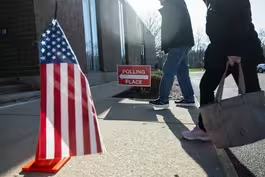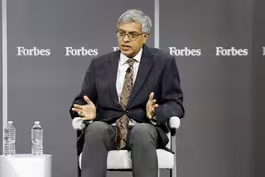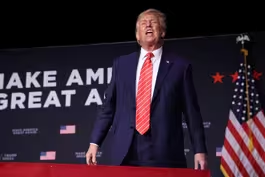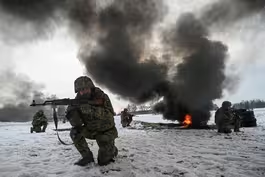
Israeli-Hezbollah deal learns from past, negotiator says
Clip: 11/27/2024 | 9m 52sVideo has Closed Captions
Israeli-Hezbollah cease-fire avoids mistakes of the past, U.S. negotiator says
Residents of southern Lebanon began returning to their homes as the U.S. brokered cease-fire between Israel and Hezbollah took effect. The agreement calls for Israel’s withdrawal, for Hezbollah to move its fighters, and the Lebanese armed forces deployment to conclude within 60 days. Nick Schifrin discussed more with Amos Hochstein, President Biden’s special envoy who led the negotiations.
Problems playing video? | Closed Captioning Feedback
Problems playing video? | Closed Captioning Feedback
Major corporate funding for the PBS News Hour is provided by BDO, BNSF, Consumer Cellular, American Cruise Lines, and Raymond James. Funding for the PBS NewsHour Weekend is provided by...

Israeli-Hezbollah deal learns from past, negotiator says
Clip: 11/27/2024 | 9m 52sVideo has Closed Captions
Residents of southern Lebanon began returning to their homes as the U.S. brokered cease-fire between Israel and Hezbollah took effect. The agreement calls for Israel’s withdrawal, for Hezbollah to move its fighters, and the Lebanese armed forces deployment to conclude within 60 days. Nick Schifrin discussed more with Amos Hochstein, President Biden’s special envoy who led the negotiations.
Problems playing video? | Closed Captioning Feedback
How to Watch PBS News Hour
PBS News Hour is available to stream on pbs.org and the free PBS App, available on iPhone, Apple TV, Android TV, Android smartphones, Amazon Fire TV, Amazon Fire Tablet, Roku, Samsung Smart TV, and Vizio.
Providing Support for PBS.org
Learn Moreabout PBS online sponsorshipWILLIAM BRANGHAM: Welcome to the "News Hour."
The cease-fire between the Israeli and Lebanese governments, and including the militant group Hezbollah, that went into effect early this morning, appears to be holding.
And for the first time in nearly 14 months, residents on both sides of the border are heading back to their homes rather than running from bombs.
Nick Schifrin speaks to the American negotiator who helped secure the deal.
But, first, he reports on the situation the ground today.
NICK SCHIFRIN: Today in Southern Lebanon, a rare and precious feeling, hope.
Families displaced by 14 months of war rush to return home.
And Lebanese soldiers rush to the country's borders, the first step to implementing the cease-fire.
In Hezbollah's stronghold in Southern Beirut, a celebration amidst destruction.
They say the U.S.-designated terrorist group ended the war with victory, but at great cost.
The U.N. says Israeli airstrikes damaged or destroyed nearly 25,000 homes.
MAHMOUD AL AWNEY, Lebanon Resident (through translator): I have no other place to stay, so I'm forced to do this.
We say that as long as we are safe, everything can be compensated.
NICK SCHIFRIN: On the Israeli side of the border, soldiers today patrolled through areas no longer under rocket fire.
And, inside, Lebanon-Israeli commanders planned to withdraw, also claiming a form of victory, having killed most of Hezbollah's leadership and removed Hezbollah's weapons as recently as last night from near the border.
But for the more than 60,000 Israelis who fled their homes last October, some have nothing to return to, and they feel skeptical the cease-fire can hold.
KOBI KATZ, Israel Resident: We are afraid that Hezbollah will start again to build the forces.
NICK SCHIFRIN: The agreement calls for Israel's withdrawal and the Lebanese Armed Forces' deployment to conclude within 60 days, alongside Hezbollah moving its fighters north of the Litani River, which, on average, is about 17 miles north of the border.
To discuss the cease-fire, I'm joined by Amos Hochstein, President Biden's special envoy who led the negotiations.
Amos Hochstein, thanks very much.
Welcome to the "News Hour."
It's been about a day since you announced this cease-fire.
Is it holding so far?
AMOS HOCHSTEIN, White House Special Envoy to Lebanon: So far, it is holding, a couple little things here and there, but to be expected on day one.
And I think, most importantly, at about 9:00 p.m. our time last night, 4:00 a.m. local time, people woke up for the first time in almost 14 months without bombardments, raids, sirens, drones, et cetera.
So I think, for most of the people living in South Lebanon and Northern Israel, this has been a pretty monumental day.
NICK SCHIFRIN: One of the key differences between this agreement and the agreement that ended the last war, 2006 war in Lebanon, which is enshrined in Security Council's resolution 1701, is for the U.S. to chair a mechanism that will monitor and judge violations on both sides.
First question is, will that chair be a U.S. military official?
AMOS HOCHSTEIN: The chair will be both a U.S. - - it will be co-chaired by U.S. military and a U.S. civilian foreign policy or national security official on that committee that will look at the monitoring and making sure that any violation is reported immediately and dealt with immediately, not by us, but by the Lebanese army and security forces.
NICK SCHIFRIN: As you know, some in Lebanon fear that the fact that the U.S. is chairing that mechanism is primarily designed to call out Hezbollah operations and therefore provide a green light to Israeli military operations in Lebanon.
Is it?
And how can you assure parties in Lebanon beyond that it's not?
AMOS HOCHSTEIN: Look, I have spent a lot of time in Lebanon over the years and especially over the last one year.
And I think that most Lebanese, in fact, were demanding that the U.S. be the chair of it.
I can tell you, during the negotiations, every one of the parties, except for Hezbollah, wanted the United States to -- not only wanted, but insisted that the U.S. be on the committee and chair it, because I think they know that -- one, that we can work both with the Israelis and with Lebanon.
And I want to remind people, the United States has been the largest supporter and trainer of the Lebanese Armed Forces over the years, more than any other country.
So I think there's a lot of trust in the U.S., both in the Lebanese army, as well as in the Israeli military.
NICK SCHIFRIN: Beyond the cease-fire agreement, there is a letter of assurance to Israel.
In effect, have you given Israel wide discretion and latitude to act inside of Lebanon?
AMOS HOCHSTEIN: Look, the agreement itself that has now become a public document, the -- it says specifically that both Lebanon and Israel retain the right to self-defense as prescribed under international law.
In addition, the president of the United States, President Biden yesterday in the Rose Garden, specifically said that, if there are any violations that pose a direct threat to Israel, meaning that it has not been handled through the mechanism, that it would have the right to defend itself under international law.
And that is our commitment.
We did not make that a secret.
That is part of the agreement.
But the expectation is here that the Lebanese army will be able to prevent such violations and, if they do happen, that they will be mitigated or destroyed or dismantled or discouraged in a manner that does not require anyone to take any other military actions.
That is the goal of Israel.
That's the goal of Lebanon and is certainly the goal of the mechanism that we will be chairing.
NICK SCHIFRIN: You have been mentioning the Lebanese Armed Forces, known as the LAF.
They will have to secure Southern Lebanon, indeed all of Lebanon's borders, with some 10,000 forces.
But, as you know, LAF officials have long said they don't have the resources to be able to do that.
How will you help get them there?
AMOS HOCHSTEIN: Yes, so I think, if you see the agreement, what I have tried to do is -- in this document is to learn the lessons from the mistakes that were made in 1701 that you referenced at the beginning of the top of the show.
There was no implementation.
And it called for things that I believe, even at the time, were not realistic.
It called for 15,000 LAF, Lebanese army, troops.
Not possible.
This -- therefore, the cease-fire that has gone now into effect means that nobody's shooting anymore, but the Israeli military is still in Lebanon.
They will withdraw in phases.
So you will start seeing them withdraw in the next -- within the next two weeks as the Lebanese army advances to the south and deploys there.
The reason for that is what you said.
They do not have the capacity to deploy 10,000.
So what I see happening is about 5,000 Lebanese troops will be deployed to the south in the coming 60 days.
And then in the several months after that, we will do additional recruits and training of more troops to be able to go down south and get from 5,000 to 7,000 to 8,000, et cetera.
And probably it will take over a year, maybe two years to get to 10,000.
NICK SCHIFRIN: Beyond that question of capability, though, I want to go beyond that and ask about political will, political maneuverability for the Lebanese Armed Forces.
Given Hezbollah's political strength, given the sectarian nature of the army, will the LAF really be able to take on Hezbollah?
AMOS HOCHSTEIN: You talked about earlier that the big difference is the mechanism.
I would say there's one other big difference.
The end of the war in '06, 2006, Hezbollah arguably fought Israel to a draw.
That's not the case here.
Hezbollah is extremely weak at the moment.
It has lost a significant part of its capacity, its military capacity, its political capacity.
Its leadership has been decimated.
Its 30-something year leader, Nasrallah, is dead.
His successor is dead.
Much of the leadership that has been there for the last several decades are no longer there.
So there is a moment of opportunity here for Lebanon to actually -- for other parts of Lebanon to rise up and establish the sovereignty of the state, the strength of the state.
And that's what we intend to help, together with the French and other allies, to help the Lebanese do.
And then we're going to try to do that, not just supporting the LAF with the resources they need and the equipment they need, but also to support the economy of Lebanon to rebuild and return to prosperity.
NICK SCHIFRIN: What's to prevent Iran from filling in those gaps that Hezbollah now has?
AMOS HOCHSTEIN: Well, they're going to try.
But I would say Iran is significantly weaker today as well than they have been.
And part of this agreement is, we're going to try to make sure that the rearming, which happens from Iran through Syria, is at least diminished, slowed down, if not eliminated.
NICK SCHIFRIN: Who's responsible for that stopping of or who's responsible for that interdicting of weapons?
Will Russia play a part in that?
AMOS HOCHSTEIN: Well, there's two parts of this, Nick, as you well know.
Part of it is what happens inside Syria and what happens inside Lebanon.
This agreement is about what's happening inside Lebanon.
The agreement calls for the Lebanese state to take control over the -- all the crossings, all border crossings.
I think it -- believe it says authorized and unauthorized border crossings.
So the Lebanese army, but also there are other security services that are responsible for those border crossings to make sure that are -- that they take and assert their control over.
And then there's a separate question of what happens inside Syria, and that's probably a matter for a different conversation on a different day.
NICK SCHIFRIN: Amos Hochstein, thank you very much.
AMOS HOCHSTEIN: Thank you.
Take care, Nick.
'Brains and Beauty' explores how the mind processes art
Video has Closed Captions
Clip: 11/27/2024 | 6m 15s | 'Brains and Beauty' exhibit explores how the mind processes art and aesthetic experiences (6m 15s)
How psychology can help bridge divisions this Thanksgiving
Video has Closed Captions
Clip: 11/27/2024 | 10m 14s | Exploring how psychology can help bridge political divisions this Thanksgiving (10m 14s)
Trump names COVID lockdown skeptic to lead NIH
Video has Closed Captions
Clip: 11/27/2024 | 6m 54s | Trump names COVID lockdown skeptic to lead NIH, another sign of shifts in key agencies (6m 54s)
Trump's win signals acceptance of authoritarian leadership
Video has Closed Captions
Clip: 11/27/2024 | 6m 9s | How Trump's reelection signals a broader acceptance of authoritarian leadership (6m 9s)
Ukraine takes harsh measures to force draft dodgers into war
Video has Closed Captions
Clip: 11/27/2024 | 6m 26s | Lacking manpower, Ukraine resorts to harsh means to force draft dodgers into combat (6m 26s)
Providing Support for PBS.org
Learn Moreabout PBS online sponsorship
- News and Public Affairs

FRONTLINE is investigative journalism that questions, explains and changes our world.

- News and Public Affairs

BREAKING the DEADLOCK sparks bold, civil debate on America’s toughest issues.












Support for PBS provided by:
Major corporate funding for the PBS News Hour is provided by BDO, BNSF, Consumer Cellular, American Cruise Lines, and Raymond James. Funding for the PBS NewsHour Weekend is provided by...




